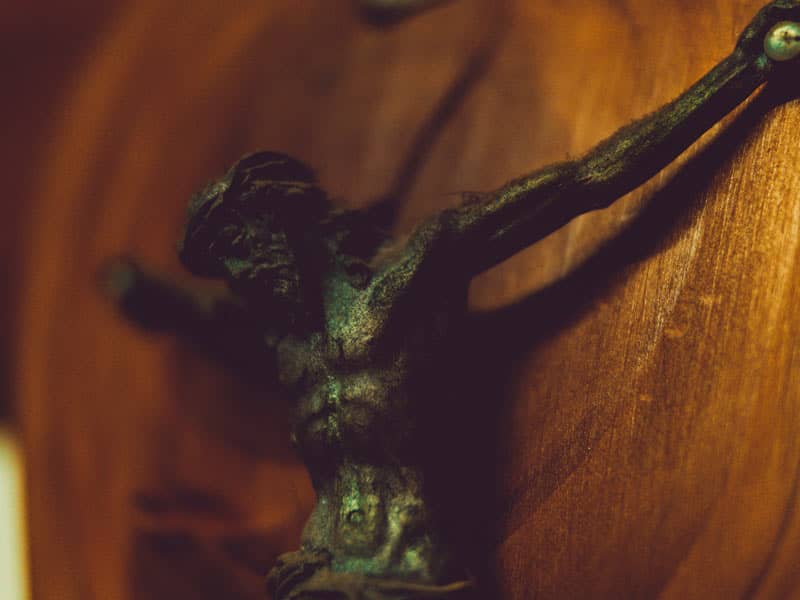This opacity in James started me thinking: Do present-day Catholics draw a similar blank on the nature of Catholic spiritual life? Nowadays, we tend to view Catholicism strictly in terms of church politics: liberals and conservatives fighting with each other over such issues as papal power, birth control, liturgical style, and competing visions of social justice. We post-Vatican II Catholics often pay little attention to the heart of our faith: Christ himself. In this respect, we've become Americanized, more like Henry James than may be good for us.
Let's look at another of James' novels with a Catholic subtheme: "The American." In this one, the hero, Henry Newman (same name as the famous cardinal), is rich. Having made his pile in his native land, he goes to Europe for a dose of leisure and culture. In Paris, he falls in love with a young widow, Claire de Cintré, born into an old, aristocratic, and very Catholic family. He sets about wooing her despite her family's negative reaction to the moneyed barbarian they think him to be. Newman proposes to Claire, and she accepts, but shortly before the wedding, the family vetoes the marriage. Claire takes her revenge by entering the Carmelite order.
It must have given James a frisson, as he wrote "The American," to portray a Wasp as a target of the class snobbery of titled Catholics in France--in contrast with America, where well-off Protestants looked down on the mainly Irish, mainly lower-class Catholics. Furthermore, as Edwin Fussell has noted, Newman describes himself as a "muscular Christian," a phrase coined by Charles Kingsley, Cardinal Newman's best-known Protestant antagonist. If James' fictional Newman had succeeded in marrying Claire de Cintré, he would likely have converted to Catholicism, following the lead of his real-life namesake, who had once been an Anglican priest. Such a possibility, while not stressed in the novel, was a constant source of drama for James. Fussell writes: "The lurid topic of Catholic conversion in the writings of the young Henry James by no means requires that a conversion be consummated, only that it be threatened."
All this makes for stirring scenes--as does Claire's entering the convent, which allows James to pull out all the Maria Monk stops, the better to send chills down the spines of his Protestant readers. But James is clearly in over his head whenever he goes near Catholic spirituality. Claire's brother, the victim of a duel, receives the last rites from a priest, but the scene never comes into clear focus. In the convent, Claire and the other sisters are portrayed as eating their hearts out for lost lovers; there is no hint that the focus of a nun's life is supposed to be God.
Although James, working in a Protestant tradition, could not see the spiritual heart of Catholicism, it was easy for Catholics to do so back then. The French Catholic writer Léon Bloy, a contemporary of James, wrote: "There is only one tragedy, not to be a saint." Those words inspired the philosopher Jacques Maritain and his wife, Raissa, to visit Bloy and convert to Catholicism shortly afterward, with Bloy as their godfather. Flannery O'Connor, another powerful Catholic writer of the pre-Vatican II era, considered her literary vocation to be the counterpart of her quest for sanctity. Although the Second Vatican Council is sometimes said to have unleashed the Catholic laity, there are few lay Catholics today who are the equals of Dorothy Day, Paul Claudel, Frank Sheed, and Maisie Ward: leading advocates and intellectuals whose primary focus, despite their worldly achievements, was cultivating love of Christ.
If many are called to that life, few of course respond, and it has been ever so. But is the ideal set before us as clearly and as frequently as it once was? When Edith Stein went into a Catholic church some years before her conversion, she was struck by the number of people stopping to pray before the Blessed Sacrament. When the Maritains conducted their Cercle d' études thomistes in the period between the two world wars at their home in Meudon, near Paris, they recommended that the Catholic artists and writers and philosophers and poets who belonged to the circle spend at least an hour in prayer each day. Time spent at daily Mass didn't count.
With the Second Vatican Council, the church came to be seen by both Catholics and non-Catholics as a battleground for liberals and conservatives. Journalists viewed the council documents as a victory of one side over the other rather than the teaching of the universal church. This political polarization has invaded our sense of ourselves as Catholics. So much of our time is spent--I do not say unnecessarily--in intramural disputes and efforts to enlist the secular media to amplify one beef or another. Have we come to regard our Catholicism as a matter of winning an argument, vanquishing an opponent, gaining a constituency with which to pressure bishop and pope? In the process, we may have lost sight of the enemy within.
Within ourselves. Faith without works is dead, no doubt, but the first and indispensable work is bringing our mind and heart into harmony with the God we profess to love. This is done above all in prayer. Silent prayer. Ideally, before the Blessed Sacrament. The young seem to realize this without our example. On my Catholic campus, as on many others, Eucharistic adoration has become a staple of the life of many students. It bodes well to be edified by the young when one belongs to a generation of Catholics that has been too busy and too noisy about too many things.

